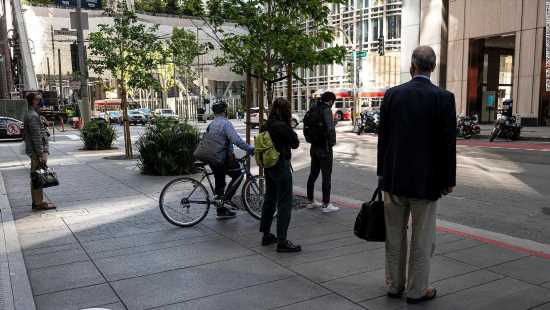New York (CNN Business)The planned grand reopening of offices across America is in serious doubt because of the Delta variant.
In the past 24 hours, a slew of major companies have told employees they will no longer be expected back at their desks in September. Notably, that list includes BlackRock (BLK), Wells Fargo (CBEAX) and other Wall Street firms that had been eager to turn the page on the era of virtual work.
The shift by these business leaders makes perfect sense. Many workers are nervous about returning to crowded offices and subway stations at a time when Covid-19 cases are soaring.
But the delayed reopening of offices sends an ominous signal about the state of both the economic recovery and the pandemic.
“There’s no upside to any of this,” Mark Zandi, chief economist at Moody’s Analytics, told CNN Business. “The question is how serious the economic downside is.”
That downside will be most pronounced for the restaurants, bars, dry cleaners, limousine companies and other businesses that had been banking on a return of office workers this fall.
“If we see a large number of companies not open back up and office towers remain dark, that would be a blow to the surrounding communities,” Zandi said.
Business travel rebound delayed?
And then there’s the travel fallout. Although hotels and US airlines have benefited from a surge in vacations this summer, that uptick was always expected to fizzle out this fall.
Airlines had been counting on the reopening of offices to spur a rebound in business travel after Labor Day. Business travel, the key to carriers returning to profitability, is still only at about half of pre-pandemic levels. If companies aren’t confident enough to reopen their offices, they are unlikely to approve pricey travel plans.
“This is going to hurt business travel this fall, especially travel to states with lower vaccination rates,” said Constance Hunter, chief economist at KPMG.
The outlook has also darkened for companies that service business conferences. The New York International Auto Show was canceled Wednesday, just two weeks before it was scheduled to open to the public.
Will the Delta variant slow the recovery?
For the most part, the companies that have announced delays to their back-to-the-office plans won’t be hurt by the shift. That growing list includes ViacomCBS (VIACA), US Bank, Twitter (TWTR), Facebook (FB), Lyft (LYFT), Google (GOOGL) and The New York Times.
These companies have already proven they can thrive in a remote environment. And some employees will be relieved to not trek back into the office and ditch their comfortable clothes for office attire. It’s also worth noting that these firms aren’t scrapping their office reopenings forever, just delaying them, in some cases for only a month.
Zandi said it would be a bigger concern if companies that can’t operate as efficiently in a virtual environment start to shut their facilities.
“That would be a tell, signaling something darker and deeper for the economy,” he said.
Zandi also said he would downgrade his economic outlook if schools begin to delay in-person learning because that would worsen the worker shortage — and could have a psychological impact.
“That would scare people and cause them to shelter in place,” he said.
Consumers are resilient
The good news is that, for the most part, real-time economic indicators suggest the surge in Covid cases is not derailing the recovery. Transit activity, air travel and hotel occupancy rates continue to rebound.
“We continue to see no evidence of the Delta variant impacting consumer behavior,” Aneta Markowska, chief economist at Jefferies, wrote in a note to clients Monday.
Even if the Delta variant eventually slows the recovery, economists are not worried about another recession. Instead, they merely see a delayed recovery. That’s because there is little appetite for a return to lockdowns.
“Right now, I don’t expect it to derail the recovery in the United States,” San Francisco Fed President Mary Daly told PBS in an interview published Wednesday.
But Daly noted the Delta variant is already “very seriously interrupting” recoveries overseas and “could definitely slow the rate of growth in our economy.”
Too early to declare victory
The delayed office openings are yet another reminder that the pandemic is not over.
“We should not be giving high-fives or holding up mission accomplished signs until we’re really sure it’s in the rearview mirror,” said KPMG’s Hunter. “Maybe we’ve been a little too optimistic.”
The experience with the Delta variant is a cautionary tale about the low vaccination rates in parts of the country and the world. The risk is that the virus continues to spread among the unvaccinated and an even more potent variant emerges.
“As long as it’s raging, other variants could develop,” Zandi said. “The next one could elude our vaccine, and that could derail the recovery.”
Source: Read Full Article



